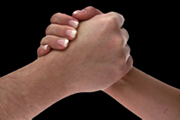 Part 1: Shared power is the only power
Part 1: Shared power is the only power
In a recent article entitled “Love and Power” in Psychology Today, Hara Estroff Marano interviews marital therapists and psychologists from across the nation, and shares their conclusion that only equally shared power creates happy individuals and satisfying marriages. Increasingly, shared power is the passport to intimacy.
The following is a short selection from her longer article.
* * *
Although many people associate power with manipulation and coercion, contemporary psychologists and philosophers have forged a new power paradigm: They view power as the capacity of an individual to influence others’ states, even to advance the goals of others while developing their full self. It doesn’t require observable behavior, let alone force.
If a woman is as influential as her partner is, then a relationship lasts, says John Gottman, professor emeritus in psychology at the University of Washington and head of Seattle’s Relationship Research Institute. But if he’s much more influential than she is, the relationship doesn’t last.
For the dean of relationship researchers, an “interlocking influence process” is at the heart of a balance of power. “It’s really about responsiveness to your partner’s emotions. If you have power in a relationship, you have an effect on your partner with your emotions. That’s a good sign for the long-term stability of the relationship and the happiness of the partners…”
And it is responsiveness to a partner is what makes a relationship feel fair. Housework and childcare chores don’t even have to be divided 50/50 to establish equality in a relationship. “A relationship has to feel fair. And that requires flexibility and responsiveness to emotions,” says Gottman.
There’s no single objective measure of fairness. People can accept unequal division of labor — as long as they have influence and are appreciated and not demeaned.
Power differences afflict almost all distressed heterosexual couples, and most occur along gender lines, at least in the United States, reports Knudson-Martin, Director of the Department of Counseling and Family Sciences at Loma Linda University. It’s not that it results from outright acts of domination. In the press of daily life, couples slip into society-based patterns that favor men’s needs and desires in ways that seem unquestionable.
“Distressed relationships tend to be organized around the interests of the more powerful, often without conscious intention,” Knudson-Martin reports in Family Process. Or partners are caught in a power struggle in which one tries in vain to influence the other, and so they are locked in argument, often about one issue over and over again — a positive sign, some experts believe, that a partner hasn’t completely sacrificed identity.
For Knudson-Martin, the mutuality of influence that is so central to equality hinges on reciprocal engagement. In her studies of the process, she has found that each partner, by being aware of and interested in the needs of the other, allows the other to feel, not only important but, supported in the relationship.
With identity and worth affirmed, partners then can open themselves to being changed by the other, to accept influence. They also feel safe enough to reveal their innermost thoughts, express concerns, even admit weakness, uncertainty, or mistakes in a partner’s presence. Mutual vulnerability becomes a high-water mark of bringing one’s whole self into a relationship.
Knudson-Martin finds that when power is equal, partners also engage in direct communication strategies. They can ask straightforwardly for what they want. They don’t use the children as their mouthpieces. They don’t devote hours to doping out the mood of their partner before broaching a topic.
* * *
See also: Love and Power – Part 2 (Estroff Marano)